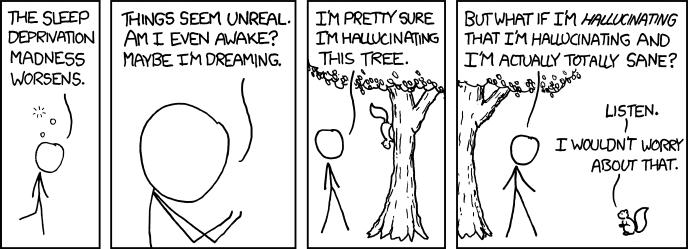Sleep Deprivation in Overnight Events
From Fellrnr.com, Running tips
In events that last overnight, sleep deprivation can become a problem. I have become much better at dealing with this problem, but I cannot identify any specific action which has provided the solution. I have listed some of the possible solutions for your consideration and I will attempt to research this further.
1 Symptoms of sleep deprivation
- Sleepiness. This is the obvious symptom, and can vary from a mild weariness to an overwhelming desire to sleep.
- Headache. I have experienced a headache that I associate with sleep deprivation; I can't describe it well, but it has a very distinctive 'flavor'.
- Hallucinations. These can be very minor 'misinterpretations', such as thinking a leaf is a squirrel, or a branch is a snake. They can be obvious, such as seeing enormous wooden cut outs in the shape of animals rising up from the middle of a lake. (This happened on my first 24 hour race). Hallucinations can also be complex and complete, as with one of my co-runners at Massanutten who saw an aid station, complete with lighting, staff, and food when there was none there.
2 Possible solutions
- Sleep. This is the obvious solution, but in many competitive situations it is not possible. Surprisingly, a short sleep of 5 to 15 minutes can remove most symptoms. You will still be tiered, but without the headache and hallucinations, you may make up more time than is lost sleeping. It is important to have someone wake you after the desired time; I would not trust an alarm. As an aside, my limited experiences with sleeping in an endurance event have resulted in 'lucid dreaming', where part of my mind is fully asleep, but another part is still conscious. This is a very strange experience.
- Caffeine. Using a stimulant like Caffeine helps only a little. Caffeine does work well as an ergogenic (aids energy production) and can offset some of the weakness associated with DOMS. Caffeine can reduce the feeling of sleepiness, but I have not found it to help with the headache or hallucinations. The stimulant in chocolate (Theobromine) has similar, but milder, effects.
- Mindset. I wrote a section on the psychological issues with Running in the Dark, which are applicable here. [reference]
- Intensity. I suspect that exercising at a higher intensity may help with some of the sleep deprivation issues. However, at Massanutten I was going very, very slowly and had no problems even after 34 hours.
- Practice. I have become better at dealing with sleep deprivation in recent times. I'm not sure if simple practice has helped, or if it is some of the other changes.
Do you have hints, tips or techniques for dealing with sleep deprivation? Send them to me and I will add them to the list.
3 See Also
- Essential Ultrarunning Tips
- A brief guide to ultramarathon distances
- Training for your first 100 mile race
- Your First 100 Mile Race
- Walking Breaks
- Fueling in an Ultra
- Aid Stations
- Drop Bags
- Zeo Sleep Monitor
